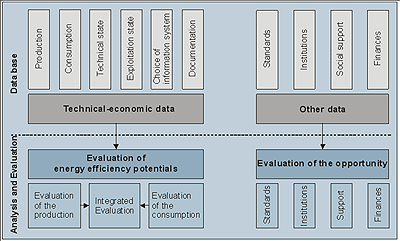 |
 |
 |
 |
 |
 |
 |
 |
 |
 |
 |
 |
Application of tools
Name of the case study
Municipal Energy Efficiency Programme, Municipality of Gabrovo
Name of tool
Ranking Criteria for Priority Assessment (RCPA)
Description of tool - character
Ranking Criteria for Priority Assessment (RCPA) tool is applied for the purposes of:
(i) Analysis, evaluation and definition of priority areas and target groups of MEEP - ranking the target groups by: potential for producing energy, potential for consuming energy, technical state and exploitation conditions; integral ranking according to technical-economic potential for energy efficiency. The assessment is based on "key number" software, elaborated by ENSI (Energy Saving International AS - consulting company, Norway) and adopted for Bulgarian particular climate conditions.
(ii) Estimation of alternative measures – rating the target groups according to "weight coefficient" by: energy consumption, municipality’s influence, motivation and commitment for participation in the Programme. The complex intervention into a limited number of selected sites is based on a combination of different measures, which provides for a maximum utilisation of the energy saving potential. The selection of sets of the most cost-effective measures ("cream skimming" method) usually leads to rapid and greatest energy savings. This is very appropriate in the cases when municipalities are faced with grave financial difficulties for a short period of time. The combination of measures, which are cost-effective, with more expensive ones, however urgently needed measures, usually results in an acceptable average general level of effectiveness and ensures the long-term effect of the programme.
Two main approaches are applied by RCPA during the MEEP development:
(i) Expert approach – available databases and expert assessment (local experts preferred) on current situation and possible actions to undertake;
(ii) System approach – multilevel and multicriteria analysis of compiled information.
Through the expert approach the selection of the sites of the programme impact, the assessment of the baseline status and the selection of measures for impact are carried out. The reliability of this approach depends on the reliability of the available information, the qualification of the involved experts and the techniques applied. Sometimes the expert assessments may considerably influence the political will of municipal decision-makers. The expert approach is considered particularly appropriate for small municipalities where local expert evaluation could cover all aspects of the processes while keeping high sensitivity to the case peculiarities.
The assessment and decisions based on the system approach suppose complex analyses of a considerable amount of objective information. This approach is more reliable, however more time- and effort-consuming. It is connected with a more substantial preliminary work and presumes that experts, who apply it, have specific capacity and qualification. For the implementation of the system approach Municipalities need a lot of information based on: national and regional registers, expert assessments, expenditure for energy consumption.
The assessment of the baseline information about the technical data of the energy systems in the municipality and about the regulation, institutional, human and financial capacity of the municipality to implement MEEP is conducted in terms of:
(i) targets groups (based on Dutch methodology – Agency on Environment NOVEM),
(ii) single objects (based on American methodology with support of John Deakin (Director, Bureau of Energy Conservation Water and Power Public Utilities Commission, City and Country of San Francisco, California, USA);
(iii) combined analyses of targets groups and single objects.
During the demonstration project implementation in the city of Gabrovo EnEffect initiated the elaboration of a Municipal Energy Efficiency Information System (MEEIS) with two main components (see diagram below):
(iii) database of technical, economical, regulation, etc. information;
(iv) analyses and assessments based on technical, economic, social, ecological criteria.

Energy efficiency information system
The tool applied is an assessment method for prioritising activities towards energy efficiency. A Municipal Energy Planning Manual (MEPM) for local experts including step-by-step guide for MEEP development and the methodology for applying the assessment tool is published by EcoEnergy.
Description of tool - availability
The Municipal Energy Planning Manual (both paper-based and a digital version) for local experts´ tool is freely available to members of EcoEnergy municipal network; it could be also purchased from EnEffect.
Description of tool - existing
The tool used in this case study is a newly developed tool by EnEffect.
Description of tool - adaptation
• MEEIS compiles and systematises information about the building stock, which is either municipal property or has been put under the care of the municipality (street lighting infrastructure, schools, etc.). The database for the system is used in the elaboration of Municipal Energy Programs, in particular energy efficiency projects and in the process of energy consumption management in municipalities. It provides for determining the real energy saving potential in the municipalities and for identifying the opportunities for its efficient utilisation.
• Interviews and discussions with local authorities were undertaken to identify their attitude and opinion about the possibility for an effective programme implementation. The results were used to better adjust the programmes to the particular context.
What tools were used to assess sustainability?
Ranking Criteria for Priority Assessment (RCPA)
More information